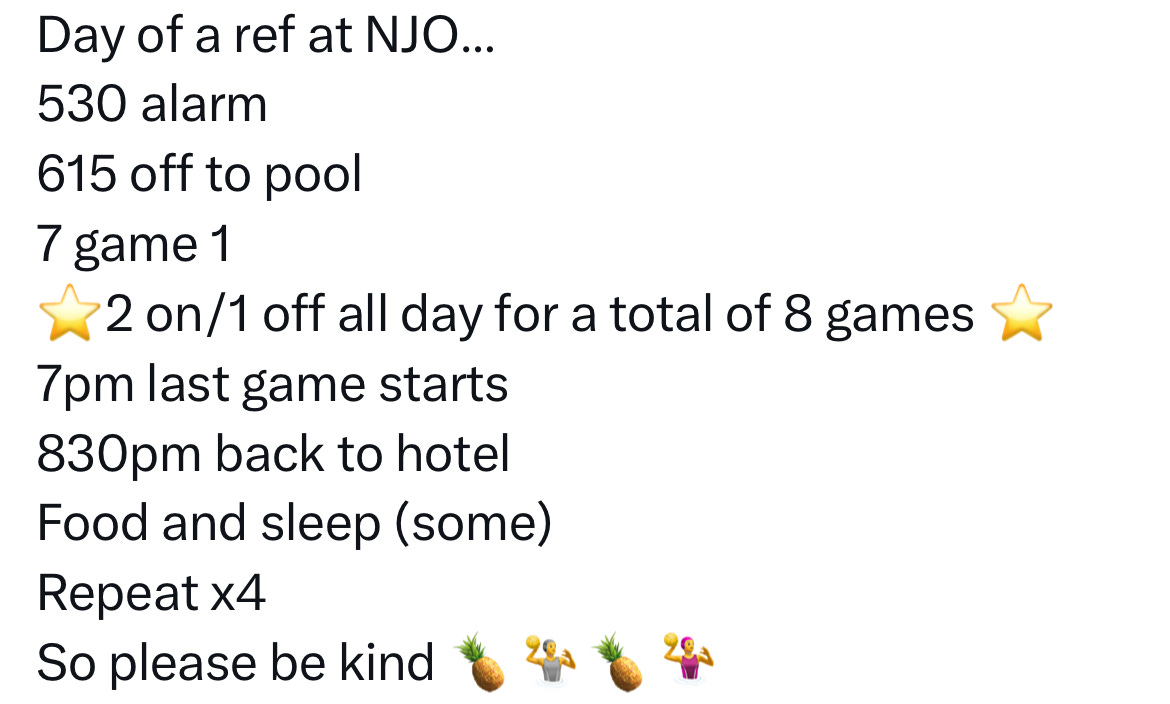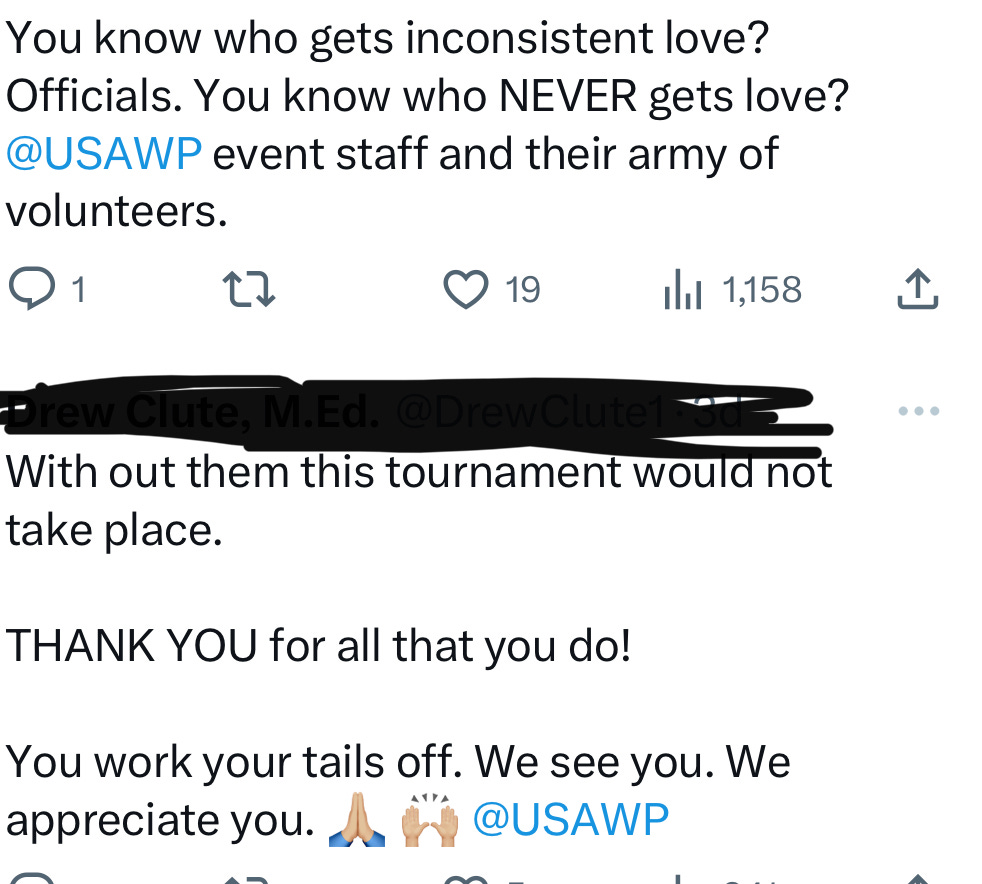Over the last week and a half, hundreds of families have converged in Orange County for the annual water polo bacchanalia that is USAWP National Junior Olympics. Advertised for years as the “largest age group water polo tournament in the world,” that moniker is more true than ever now if you choose to include the expanded format in Texas—and you can be certain that USAWP wants that tournament included in that statement as well as legitimized in relation to its California counterpart. This sprawling event is meant to be and advertised as the culmination of the club season; the most important and largest event USAWP puts on every year; a national club championship, an advertising and merchandising event for USAWP and its partners; and a number of other things both real and imagined. In scope and scale, the event is larger than it has ever been and only continues to grow. So, this is positive and a sign of good things for the sport right? Junior Olympics is an event we should all cherish and be proud of and proud to participate in right? It’s a tournament that really puts on display the values and priorities of USAWP and puts the sport’s best foot forward…right?
I will admit, I have never been the biggest fan of Junior Olympics dating back to my own time as a player, but even when I was in the weeds of the club coaching world I was always less than enthused about attending the event. Something about the hectic schedule, the crowded pool decks and general tension of all the adult participants really turned me off even as I was enjoying successes and failures at the event itself. However, it has been almost half a decade since I attended Junior Olympics and I am always open to see how things have grown and changed, so when a friend from out of state asked me to tag along with his team throughout their week of training prior to JOs and into the event itself I was excited to see the tournament from a more outsider perspective than I ever had before.
My suspicions that things were as bad or worse than ever started when I attended several of the scrimmages with local teams that were set up in the week prior to Junior Olympics itself. The talk on the deck amongst the coaches, both California and out of state, was almost unanimously critical of Junior Olympics. Already a pretty sardonic bunch, the second the JO “experience” is brought up around coaches the sarcasm quickly reaches levels of eye rolling usually reserved for teenagers. The complaints are long and not uncommon to all youth sports and tournaments: long days, too much of an emphasis on one event, the worst in parents being brought out, that no matter what seed or bracket you’re in you almost always end up playing 2-3 blowouts and then end up playing games against a handful of teams you see over and over all year, etc. Having experienced Junior Olympics as a coach, it is hard to disagree; Junior Olympics is not, generally, a fun experience to coach.
This thought—that JOs isn't a fun experience for at least one of the major stakeholder groups involved in the event—was on my mind as I began to follow the coverage of Junior Olympics on social media. And that thought is what made these tweets really stand out to me:
I was not known as a sympathetic coach to officials when I was coaching, and I certainly don't think that they are impeccable or unimpeachable in how they call the game or for certain ways they behave. However, I do respect the job that officials do and think that they should be set up to succeed the same as any other stakeholder in the sport. There is no way that you can convince me that a schedule for an official like the one related above is good for any party involved in the event.
Likewise, I’m sympathetic to the administrative and staffing burdens of staging an event of the scale of NJOs. Every year, there is a mad scramble to make sure there are enough pools secured and staff to cover the tables and the door for those events in addition to the myriad other major and minor emergencies that can arise when running any event. Based on the scale of Junior Olympics, the yearly quality of the event is no small feat; moreover, it seems obvious that the task of the yearly event is a huge burden for those USAWP event staff and volunteers that execute the event. It shouldn’t be controversial to say that this officiating schedule and the logistical burdens of planning and staffing the event is a sacrifice or a hardship for those assigned the task.
But certainly all this sacrifice on the part of coaches and officials and event organizers is worth it because it is met with high levels of satisfaction with the event expressed by the parents and families involved. On the pool decks I was on, it was easy to overhear parents throughout the event bemoaning the weather, and the scheduling, and the costs, and the coaching, and the players from the other teams and pretty much every other thing that could be used to manufacture complaints . Often, the level of complaining from parents went up as the age of the athletes went down.
These vociferous and sometimes ugly complaints reached a real head on one of the few places online for interested parties to discuss American water polo: the waterpoloplanet.com message boards. The discussions there centered on the topic of what teams did and didn’t “deserve” their seed, what teams were forming “super teams” in an attempt to win a medal (as young as 12u), and especially on the topic of which teams brought in “foreign ringers” for the tournament and whether that was a good thing or not. Whether on the pool deck or online, it doesn’t seem like it’s easy to find a parent who is satisfied with attending Junior Olympics.
If you have been reading closely, you may have recognized what has been missing from this discussion so far: the kids. If you really want to get down to it, the event is meant to be for and about the kids and their experience; that is the justification for the sacrifice on the part of the adults.
I’m certainly not denying that athletes, kids, have fun at Junior Olympics. Quite the opposite. I see them having fun on the grass outside the venue as they relax with their team between games (often before quickly being bundled into cars and SUVs to combat the traffic and make it to the next venue in time). I see them having fun in short bursts in the warm up area (mostly before a coach scolds them about focus and being “serious”). But I struggle to see fun being had in the game itself even when played by these young athletes. There is certainly joy and celebration as struggles are overcome and games are decided, but those emotions are also coupled with the sadness and disappointment on the losing side. Such is the nature of sport.
What I'm referencing is the fun of playing a sport for the sake of the sport itself. Not to win a medal, or secure a place or be seen by a college coach or whatever other adult concerns can be brought to youth sports by professionalizing them and emphasizing the wrong things—whether purposefully or implicitly.
If there is value in youth sports at all, some of that value comes from the ways they can expose children to positive role modeling and prioritization on the part of the adults involved. Moreover, how these values are modeled is not just on an individual scale. How an event like Junior Olympics is run–how the adults involved from all stakeholder groups feel and behave and relate to the event both publicly and privately–is informing our young athletes what we really value and expect: hardship, overwork, burden, the superficial appearance in place of value. And perhaps I shouldn’t be surprised by this; the slogan of USAWP is after all “Water Polo Tough” not “Water Polo Fun.”
There are certainly benefits and positive aspects to Junior Olympics that I have not discussed here. Likewise, there are certainly other criticisms that could be leveled at Junior Olympics as well. This was never meant as a condemnation of Junior Olympics as a whole or to suggest that there is no value in the event. However, the intent was to challenge the reader to think about their own experiences and relationship with Junior Olympics and examine critically both the good and bad things about the event. Finally, the hope is that such examination and the discussion it can foster encourages water polo in America to move forward in a more pragmatic and purposeful way. A direction that doesn’t overburden organizers and volunteers and officials for the sole purpose of making something bigger and broader and in all ways “MORE.” A direction that keeps the emphasis in youth sport on the values of positive participation, fair play, and long term enjoyment and participation.
I believe that USAWP wants to put on the best event possible for all parties involved. I believe officials want to do their best and be on their best. I believe coaches want to grow their athletes in a way that is positive and encouraging. I believe parents want a sports experience that is best for their children. I believe we all want the kids who play water polo to fall in love with the sport the way many of us have.
I just don't believe that Junior Olympics is fulfilling the values or intentions of these objectives.
I would love to hear your thoughts on what you think about the Junior Olympics experience in the comments below. Until next time, keep thinking water polo.






Where to start…
The first thing USAWP needs to address is the disparity between how the boys’ and girls’ events are treated. The boys’ tournament has plenty of space, more officials working fewer games, and better organization. Then they shove all the 10’s, and 12’s coeds into the second session. This crunches the pool space, limits the number of officials available (also because fewer officials want to work the second session), and crowds the pool decks and parking lots.
You had 14 girls platinum playing in a 5-lane course in Corona, and wall goals in Villa Park. That would never be tolerated on the 14 boys’ platinum side.
Throughout my entire life USAWP has been trying to reinvent the wheel with their men’s team with little change or success. They are placated to at every level, and this JO’s was no exception. You know why our men can’t beat the Eastern Euros? Because they’re pampered and babied throughout their water polo lives!
Here’s your solution, USAWP: treat them like the girls!
(There’s no shortage of other issues with JO’s, and you covered a lot of it, but that’s the most egregious one I saw).
We at SHAQ, had a blast at JOs. Overall felt the officiating and desk workers were great. Some pools may have been a little small but we understand how hard it is to schedule that many games. I had fun videotaping some 10u parental behavior in the stands and hope someday that parents remember that kids can not hear their coaches when you are berating the referees or telling them to shoot. Go USA Polo and Go SHAQ. Mark Anderson